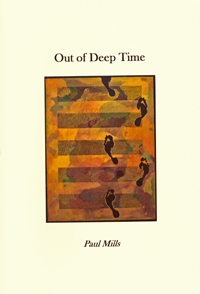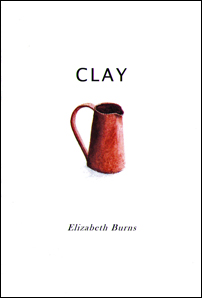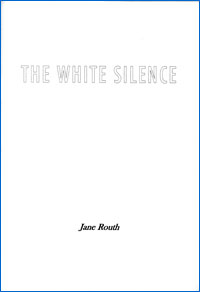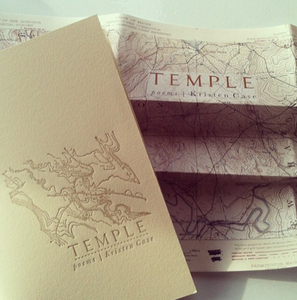Out of Deep Time by Paul Mills
– Reviewed by Sarah Hymas –
Out of Deep Time, as the title indicates, is a wide-ranging pamphlet with a relaxed, inclusive long view. Poems are playful, thematically interconnected, in dialogue with each other and, as a whole, make for a collection that is both within reach and yet somehow also slipping beyond.
The opening poem, ‘From the Palaeolithic’, sets the tone. A familiar domestic setting of condensation running down the kitchen window becomes a scene in which a man appears, “one of the first coming into Europe / out of the east following rivers and sunsets”, who is “one of the first sons of the mother who is our mother”. The narrator considers him and how he might interact, at this imagined point of temporal dissolution, with a tone that twists about despair and uncertainty, the reality of his destructive capacity and vulnerability, hinting at climate change, never quite settling, just as the trickles of water disappear. The trickles are described as “wriggling forest vines”, which flashes forward to another poem in the pamphlet, ‘A wriggle’. Here, the protagonist is Time itself, invisible but for its wriggle, watching the “new creature / unclenched its feet and stood erect”, planning to keep it subordinate. Time is, understandably, a trickster, taking pleasure in its power and the subsequent powerlessness of the creature who “had started digging / found little bits of itself and put them together…” Time’s forecast is not positive for the ‘creature’, and the linking back to the first poem is hinted at in the penultimate line where the creature is “smeared on the invisible”, in a strange slightly disorientating telescoping of timeframes and perspectives that give the pamphlet a vitality that keeps these poems, which often, rightly it seems, have a disheartening view on outcomes, free from a pessimistic tone that may otherwise overwhelm.
Other poems, such as ‘Song without words’, are more tentative in their perspective, raising the notion of durational time, time that lingers, vapourises, that connects and separates creatures (I assume humans from nonhumans). The role of predator and predated shifts into the “swaying of minds together”. Here the lack of punctuation, sustained throughout the pamphlet, allows the images and lines to slide across each other, and rub up against each other, while being contained lightly in the couplets of the poem. The voice of this poem is more remote, does not take a position, is not a narrator or protagonist, describing what comes from “deep in the throat / in the chest”, so enabling the reader of the poem to draw it from their throat and chest, to embody the poem, to articulate it, to become one of the creatures in it.
As well as time migrating, poems feature physical migrations, journeys across landscapes and across poems. A series of poems that declare themselves to be the story of hands – of glass – of a line unfolds a sense of human activity, or perhaps industry, from the body to the wider world and back to the body, and the need to communicate, to connect, to make sense and impact which seems in the scheme of the pamphlet a futile but necessary drive that pulls us out of ourselves and across the world. ‘The journey from Easter Siberia to Tierra del Fuego’ concerns itself with mass migration, widening out to cover vast tracks of time – two thousand years, more – that is somehow loosely contained within this poem, and not at all diminished by being so. It stretches around the world, on the physicality of the task, the details, the tools, the knowledge, to the hairs on the back of the neck. In it there is a stanza:
alone and not alone there were ghosts
the dead so easily offended
must be abandoned
The dead are clearly not abandoned in this pamphlet, but upheld as stories, as spirits as the vital life that has resulted in these poems being written and read. The odds against the survival of the species seem to be underlined again and again: in this “long journey”; in the 1832 witnessing of Charles Darwin of a people whose “future appears to him like their past abject/ a long steep-sided sound from end to end swallowed by cloud”; in an Arctic expedition where hope seems an irrelevance.
Elsewhere, Mills writes of a “finished past”, yet the past of this book, spun so continuously into the present wherein future slides, is constantly searched for, found, unmade, remade – imagined and set against the land-and-air-scapes of these poems. They have the sense of being unearthed, disturbed in the rubble of the archaeological dig, as if the language, the questions, images and ideas have been upturned, shown the light for the first time, along with creatures in the poems, still settling amongst the remains. This pamphlet reminds us of our collective past, the reach of it, that encompasses humanity while managing to maintain a sense of geo-centricity. In doing so, it remarkably gives hope for a collective future.





